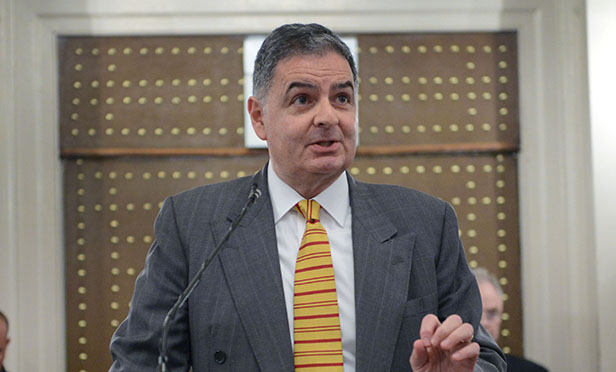NY Judicial Commission Sees Record Number of Complaints
The Commission on Judicial Conduct on Friday released a 268-page annual report showing that it received 2,143 complaints in 2017, the highest total of new complaints in its history and a 10 percent increase from a year earlier.
March 09, 2018 at 03:05 PM
5 minute read
 Robert Tembeckjian, administrator of the Commission on Judicial Conduct. Photo: Rick Kopstein/NYLJ
Robert Tembeckjian, administrator of the Commission on Judicial Conduct. Photo: Rick Kopstein/NYLJ ALBANY — The commission responsible for investigating misconduct complaints against New York judges received a record number of complaints in 2017.
The Commission on Judicial Conduct on Friday released a 268-page annual report showing that it received 2,143 complaints in 2017, the highest total of new complaints in its history and a 10 percent increase from a year earlier. The majority of complaints the commission received came from criminal defendants and civil litigants, according to the report, but 53 complaints came from lawyers and 12 from judges.
The commission found that the number of complaints it receives annually has risen substantially over the last decade compared to the first 30 years of its existence.
There are approximately 3,350 judicial positions, according to the report, and 60 percent of judges in the state unified court system are part-time town or village justices, and 61 percent of them are not lawyers, that is, about 36 percent of all judges in the state are not lawyers.
One formal proceeding last year resulted in a removal from office, and that was the case of J. Marshall Ayers, a justice of the Conklin Town Court, Broome County, for “lending the prestige of his judicial office to get his daughter's traffic ticket dismissed and for trying to influence a County Court judge to uphold restitution orders he had issued in a separate, unrelated case.”
Some complaints were dismissed upon initial review as being without merit. The commission authorized “preliminary analysis and clarification,” as well as “preliminary fact-finding activities” that led staff to conduct 605 preliminary inquiries last year. In 148 matters, the commission authorized what the report called “full-fledged investigations,” which included interviewing and subpoenaing witnesses and analyzing court records.
In addition to 148 new investigations, there were also 177 investigations pending from previous years. The commission eventually disposed of a combined 325 investigations. Of those, 80 were dismissed outright;, 30 complaints involving more than two dozen different judges were dismissed with letters of dismissal and caution; and 25 complaints involving 15 different judges were closed following the judge's resignation, according to the report.
Four complaints involving four different judges were closed because of a vacancy for reasons other than resignation—such as term expiration. An additional 31 complaints involving 17 different judges resulted in authorization of formal charges, according to the report.
As of the end of 2017, 155 investigations at the commission were still pending.
The commission also rendered eight formal disciplinary determinations in 2017, which included one removal, five censures and two admonitions.
City court judges, all of whom are lawyers, received the most complaints, the report shows. The commission received 23 complaints against part-time city court judges and 355 complaints against full-time city court judges, for a total of 378. One of those complaints resulted in a judge being cautioned after the probe. Formal written complaints were authorized for two of the complaints filed.
While city court judges had the most complaints, town and village justices—not all of whom are lawyers—received the most disciplinary actions. The commission received a total of 280 complaints against town and village justices, 162 of which were against nonlawyers and 118 of which were against lawyers. The commission investigated 83 of the complaints filed.
Fifty-six percent of investigations authorized by the commission were for town and village justices and 44 percent were for all other judges in the state's unified court system.
Eight complaints against town and village justices who are lawyers resulted in the judges being cautioned and three resulted in formal written complaints. One judge, who is a lawyer, was publicly disciplined and one judge vacated the office by public stipulation.
As for town and village justices who are not lawyers, 13 judges were cautioned after the investigation and eight judges had formal written complaints authorized. One nonlawyer judge was cautioned after a formal complaint and five nonlawyer judges were publicly disciplined. An additional six judges vacated office by public stipulation and formal complaints against two were either dismissed or closed, according to the commission.
Supreme Court justices, of whom there are 462, all full-time and all lawyers, received 344 complaints and 16 were investigated.
“Year after year, with insufficient resources but committed members and a dedicated staff, the commission promotes public confidence in the integrity of the courts by disciplining those judges who have engaged in misconduct, and exonerating those who have been wrongly accused. It also protects the independence of the judiciary by absorbing and even defusing the criticism of those who disagree with a judge's rulings,” Robert Tembeckjian, the commission's administrator, said in a statement.
The uptick in complaints against the judiciary comes as the commission is asking the state for a budget increase in an effort to cut backlogs. The commission has asked the Division of Budget for an increase of $541,000, or 9.69 percent. Their current budget this fiscal year is $5.58 million, “a mere 3.3 percent” above the commission's budget during the 2011 fiscal year, Tembeckjian said in mid-December. Budget negotiations begin in earnest in mid-March with a financial plan for the state due by the start of the next fiscal year, April 1.
This content has been archived. It is available through our partners, LexisNexis® and Bloomberg Law.
To view this content, please continue to their sites.
Not a Lexis Subscriber?
Subscribe Now
Not a Bloomberg Law Subscriber?
Subscribe Now
NOT FOR REPRINT
© 2025 ALM Global, LLC, All Rights Reserved. Request academic re-use from www.copyright.com. All other uses, submit a request to [email protected]. For more information visit Asset & Logo Licensing.
You Might Like
View All
Snapshot Judgement: The Case Against Illustrated Indictments

Read the Document: DOJ Releases Ex-Special Counsel's Report Explaining Trump Prosecutions
3 minute read
Ex-NYC Mayor de Blasio Must Pay $475K Fine for NYPD’s Presidential Campaign Security
3 minute read
Alston & Bird Adds M&A, Private Equity Team From McDermott in New York
4 minute readTrending Stories
Who Got The Work
J. Brugh Lower of Gibbons has entered an appearance for industrial equipment supplier Devco Corporation in a pending trademark infringement lawsuit. The suit, accusing the defendant of selling knock-off Graco products, was filed Dec. 18 in New Jersey District Court by Rivkin Radler on behalf of Graco Inc. and Graco Minnesota. The case, assigned to U.S. District Judge Zahid N. Quraishi, is 3:24-cv-11294, Graco Inc. et al v. Devco Corporation.
Who Got The Work
Rebecca Maller-Stein and Kent A. Yalowitz of Arnold & Porter Kaye Scholer have entered their appearances for Hanaco Venture Capital and its executives, Lior Prosor and David Frankel, in a pending securities lawsuit. The action, filed on Dec. 24 in New York Southern District Court by Zell, Aron & Co. on behalf of Goldeneye Advisors, accuses the defendants of negligently and fraudulently managing the plaintiff's $1 million investment. The case, assigned to U.S. District Judge Vernon S. Broderick, is 1:24-cv-09918, Goldeneye Advisors, LLC v. Hanaco Venture Capital, Ltd. et al.
Who Got The Work
Attorneys from A&O Shearman has stepped in as defense counsel for Toronto-Dominion Bank and other defendants in a pending securities class action. The suit, filed Dec. 11 in New York Southern District Court by Bleichmar Fonti & Auld, accuses the defendants of concealing the bank's 'pervasive' deficiencies in regards to its compliance with the Bank Secrecy Act and the quality of its anti-money laundering controls. The case, assigned to U.S. District Judge Arun Subramanian, is 1:24-cv-09445, Gonzalez v. The Toronto-Dominion Bank et al.
Who Got The Work
Crown Castle International, a Pennsylvania company providing shared communications infrastructure, has turned to Luke D. Wolf of Gordon Rees Scully Mansukhani to fend off a pending breach-of-contract lawsuit. The court action, filed Nov. 25 in Michigan Eastern District Court by Hooper Hathaway PC on behalf of The Town Residences LLC, accuses Crown Castle of failing to transfer approximately $30,000 in utility payments from T-Mobile in breach of a roof-top lease and assignment agreement. The case, assigned to U.S. District Judge Susan K. Declercq, is 2:24-cv-13131, The Town Residences LLC v. T-Mobile US, Inc. et al.
Who Got The Work
Wilfred P. Coronato and Daniel M. Schwartz of McCarter & English have stepped in as defense counsel to Electrolux Home Products Inc. in a pending product liability lawsuit. The court action, filed Nov. 26 in New York Eastern District Court by Poulos Lopiccolo PC and Nagel Rice LLP on behalf of David Stern, alleges that the defendant's refrigerators’ drawers and shelving repeatedly break and fall apart within months after purchase. The case, assigned to U.S. District Judge Joan M. Azrack, is 2:24-cv-08204, Stern v. Electrolux Home Products, Inc.
Featured Firms
Law Offices of Gary Martin Hays & Associates, P.C.
(470) 294-1674
Law Offices of Mark E. Salomone
(857) 444-6468
Smith & Hassler
(713) 739-1250






